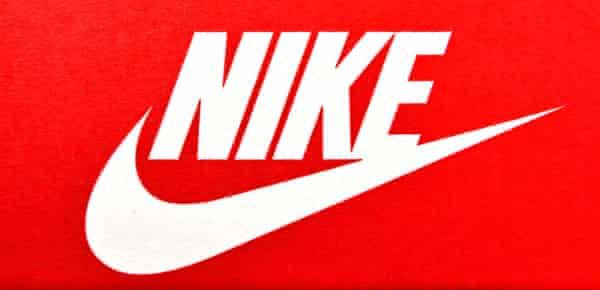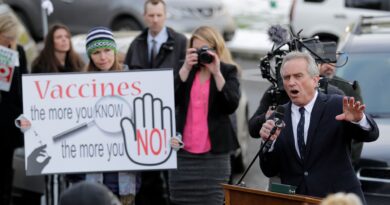Nike and Amazon among brands advertising on Covid conspiracy sites
Dozens of the world’s biggest brands, including Nike, Amazon, Ted Baker and Asos, have been advertising on websites that spread Covid-19 misinformation and conspiracy theories, it has emerged. The companies, as well as an NHS service, are among a string of household names whose ads appear to have helped fund websites that host false and outlandish claims, for example that powerful people secretly engineered the pandemic, or that vaccines have caused thousands of deaths.
Analysis of nearly 60 sites, performed by the Bureau of Investigative Journalism and shared with the Observer, found that ads were placed through the “opaque” digital advertising market, which is forecast to be worth more than $455bn (£387bn) this year.
Digital advertising is delivered through a complex networks of tech companies, including Google, that match online data about people with available advertising space and then sell access to web users as they browse.
Experts said the design of this digital advertising architecture means that major brands, and their customers, may have been unwittingly funding Covid-19 misinformation.
Dr Augustine Fou, an independent ad fraud researcher and former employee of advertising agency Omnicom, said the system of bidding on ads means these sites get mixed in with other, more benign ones.
“Because they now have a source of funding, they can not only survive but also proliferate,” he said. “And that’s why we’re seeing this huge problem. Because of the lack of transparency … the companies and organisations buying the ads could be unaware that their marketing is appearing on – and potentially funding – these sources of misinformation.
Ads for Amazon services were found on more than 30 sites that carried fake news ranging from Covid conspiracy theories involving Bill Gates to claims that mRNA vaccines are “toxic”.
An NHS diabetes website was promoted alongside articles by a well-known anti-vaccine activist and the false claim that you cannot catch a virus.
“We know the ad ecosystem is incredibly opaque,” says Raegan MacDonald from Mozilla, which makes the Firefox internet browser. “It’s almost like we’re not supposed to look under the hood. Because if you do, you find this mess.”

MacDonald warns that the system is being “weaponised” and potentially putting public health at risk. “What I really hope is that this will be a sort of last straw for the brands,” she said.
The bureau examined sites that host misinformation and also carry ads, using a combination of manual checking by researchers in the US and UK and automated systems that “crawl” sites to record what happens when someone visits them.
The pages were identified with help from the Global Disinformation Index, with ad analysis provided by Rocky Moss, the co-founder and chief executive of ad quality platform Deepsee.io, and Braedon Vickers, who has built a search platform called Well-Known.
Many of the companies that arrange digital advertising are little known outside the industry, which is dominated by Google. Analysis by Moss using Deepsee’s crawlers – which simulate a person visiting web pages – found ads delivered by Google for almost 30 big brands, each appearing on two or more misinformation websites.
The most common were for Amazon Pharmacy, the drugstore run by the online retail giant, which itself has become a major player in digital advertising. Ads for Amazon Pharmacy, which is not available in the UK, accounted for more than 1% of 42,000 recorded by the “crawlers” and were found on more than 30 of the misinformation sites.
Google didn’t address the presence of ads it delivered on sites identified by the bureau, but said it took appropriate action against breaches of policies on misinformation, including cutting off publishers’ ability to make money from specific pages, or their entire sites, following repeated breaches.
“Protecting consumers and the credible businesses operating on our platforms is a priority for us,” a Google spokesperson told the bureau.
After Amazon Pharmacy, the next most-featured advertisers were computer manufacturer Lenovo, which appeared on 11 sites, and US bank Discover. Lenovo said: “Like many companies today, Lenovo uses the Google AdSense platform to serve digital adverts to consumers across the internet. With any kind of digital advertising, we give clear guidance to our media partners and agencies on what is acceptable for our brand. Lenovo does not approve the placement of ads placed on Covid-19 misinformation websites and does not condone the content it appeared next to, and we’ll will work with our media partners to review our existing protection systems.”
Ads for Nike, Honda, US pharmacy chain Walgreens and eBay were also among those recorded on multiple misinformation-spreading sites. British fashion firms Ted Baker and Asos, and the auction house Sotheby’s also appeared on multiple sites.
Xyla Health & Wellbeing, which runs the NHS diabetes prevention programme, said it had acted to stop its messages appearing on the sites.
The US Department of Veterans Affairs was promoted on two sites, one of which wrongly described mRNA vaccines as “the genetic modification injection” and claimed they made people more likely to catch Covid. The other site repeated the false claim that the coronavirus is no more dangerous than the flu.
A spokesperson for American Honda said: “We are currently working to determine how our advertising may have appeared on the websites in question. We would never support Covid misinformation or knowingly allow our advertising on such websites. Honda strongly encourages our associates to become fully vaccinated and has conducted free vaccine clinics at our operations to make that possible.”
A spokesperson for Ted Baker said: “The location of these adverts is driven by the Google Display Network. We can confirm that we have worked with Google to resolve this issue and that our adverts will not appear on these specific sites in the future.”
Asos is understood to have added the misinformation sites to its banned list. A spokesperson said: “Like most other brands, we regularly review the websites that our ads appear on and have stringent requirements and processes in place to ensure that those websites align with our values, and those of our customers.
“The available tools, however, will not always flag some smaller or newer sites. Where this happens, whenever an issue is brought to our attention, we take immediate action to ensure our ads are removed as we have done in this case.”
The other companies either declined to comment or did not respond to a request for comment.
Advertising experts said companies should work harder to monitor where their ads appear and could not simply claim ignorance.
Fou, the independent ad fraud researcher, said companies buying adverts online should not trust the agencies that buy ad space for them and should instead conduct regular investigations.
“All these middlemen, they’re intermediaries … so any dollar that flows through their platforms, they make more money,” Fou says. “They don’t have an incentive to cut down […] on the brand safety issues. In fact, they have every incentive to let it through.”
He said the scale of the online ad market means that even a tiny fraction of the total spending amounts to “significant money for the bad guys”.


